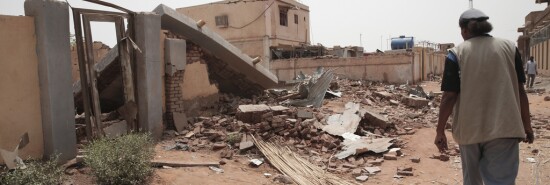
Could the US have done anything better on Sudan?
Daniel DePetris
Video Embed
For the last four weeks, the Sudanese capital of Khartoum has been a war zone. Its residents have been scrambling for the most basic items, just trying to survive another day. The city is now carved up between the Sudanese Armed Forces, led by Gen. Abdel Fattah al-Burhan, and Lt. Gen. Mohamed Hamdan “Hemedti” Dagalo’s Rapid Support Forces (RSF) paramilitary group. Medicine is in short supply, garbage is piling up, gas prices are sky-high, and RSF fighters are harassing people on the streets.
Very few of Khartoum’s healthcare facilities are functioning normally. Fighting is occurring outside the capital city as well. Around 700,000 Sudanese have left their homes, doubling in the past week. The World Food Programme estimates that as many as 2.5 million more people will require food assistance over the coming months.
US HAS EVACUATED NEARLY 1,000 AMERICANS FROM SUDAN SINCE OUTBREAK OF FIGHTING
The international community wants to nip the violence in the bud before it becomes a proxy war as foreign powers or elements, such as Egypt, Libya, Saudi Arabia, and Russia’s Wagner mercenary group, pick favorites.
The United States and Saudi Arabia have organized talks in the Saudi coastal city of Jeddah between Burhan’s and Hemedti’s representatives. The objective: get both sides to agree to a short-term cessation of hostilities in order to free up humanitarian aid flows, perhaps in coordination with African Union troops. The ultimate end goal is the establishment of a durable, long-term ceasefire that would provide an opportunity to get Sudan’s democratic transition back on track.
The U.S. has a poor track record on Sudan, however.
Reporting from Foreign Policy magazine’s Robbie Gramer indicates that U.S. officials previously believed Washington could work with the two combatant leaders towards resurrecting a civilian-led government. They believed this despite the fact such a government would likely subject Burhan and Hemedti to intense scrutiny and threaten their economic power bases. Indeed, those leaders had already dissolved the transition process two years earlier, when the civilian prime minister at the time was pushed aside and arrested.
The U.S. responded to the coup by cutting off $700 million in economic assistance and suspending billions of dollars in debt relief to Sudan. But for many U.S. officials, this was a slap on the wrist. As one U.S. official told Gramer, “There was the right thing to do, to show the Sudanese people we were all-in on democracy, to punish Hemedti and Burhan for this blatant coup, and then there was the wrong and slightly more expedient thing to do, [to] just keep working with them after some stern finger-wagging. We chose door number two.”
CLICK HERE TO READ MORE FROM THE WASHINGTON EXAMINER
Could tougher U.S. action have led to different results? Perhaps. But it’s hard to prove a counterfactual. Sudan, after all, was a nation cut off from the U.S. financial system and under a strenuous list of economic sanctions for three decades. The West already treated the country as a pariah state, so to expect even deeper sanctions would change Burhan’s and Hemedti’s behavior could have been wishful thinking. The theory is going to be tested soon. Last week, President Joe Biden issued an executive order sanctioning any person threatening Sudan’s peace, security, and stability, blocking its transition to democratic rule, or engaging in human rights abuses (among other sins).
Sudan may have been one of those cases where democracy would lose out regardless of what the U.S. or any other country did. Include the Sudanese military in the transition process and you give it an opportunity to spoil the party; keep the generals out and you’re liable to spoil a transition before it gets off the ground.
Daniel DePetris (@DanDePetris) is a contributor to the Washington Examiner’s Beltway Confidential blog. His opinions are his own.
